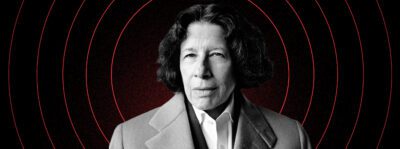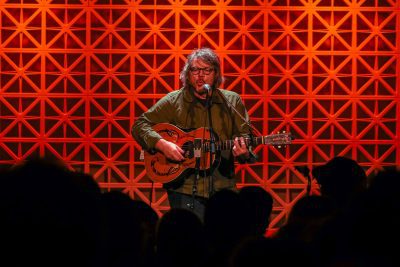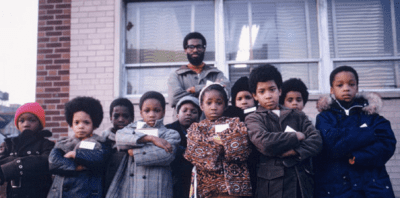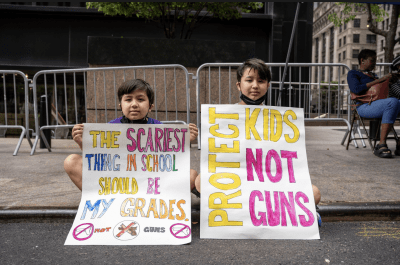Joey Bada$$ (photo by Waqas Ghani)
‘Now it is time for an evolution’: Joey Bada$$ discusses what’s next
A year after the release of '2000,' the rapper discusses emotional intelligence, his Broadway ambitions and playing Afropunk next month
Joey Bada$$ burst onto the scene at the age of 17 with the acclaimed 2012 mixtape “1999,” establishing him as one of the more exciting MCs in recent years.
A decade, two mixtapes and two albums after the release of “1999,” the Bed-Stuy rapper released “2000” last year. His most recent single, “Fallin’,” dropped in April and represented a stylistic departure, venturing more into hazy R&B.
To mark the one-year anniversary of “2000,” Bada$$ will perform at Amazon Music’s “50 & Forever” special edition City Sessions today — celebrating hip-hop’s 50th anniversary — at the Rooftop at Pier 17. He’ll return to Brooklyn for Afropunk next month.
Brooklyn Magazine sat down with Bada$$ (born Jo-Vaughn Virginie Scott in East Flatbush) about his evolution as an artist, getting in touch with his feelings and opening up about his love life.
This interview has been lightly edited for concision and clarity.
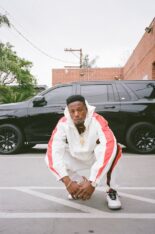
Joey Bada$$ (by Waqas Ghani)
Your latest single, “Fallin’,” is different from what you’ve done before. What was the process like making this song?
I made that joint about four or five years ago. At the time, I was in a very experimental stage, and it was just like a jam session. It was a vibe that I’ve always loved since the moment I made it, but I felt like I never had the proper outlet or I never found the perfect timing to put it out until now. I revisited it and did some more ad-libs and added a verse to it so it still feels pretty fresh and new to me.
Saturday marks a year since you released “2000.” It can often take time for hip hop records to be truly appreciated. What was the reception of the album like when it was first released compared to now?
There was a long gap between albums, so naturally there was a super high expectation. I expected that, that people wanted it to be the fucking best album of all time, and for some people it is. For me, it’s definitely one of the best that I’ve made. I love what it has done, and I love where it is at. I still feel confident that I made the right decision by delivering that album at that time. That gave me the motivation to do what I’m about to do next, taking it in a different direction now. I want to take risks and be more experimental because I’ve proved everything that I’ve had to prove as a rapper, and now it is time for an evolution and expansion of all of that good shit.
You’ve talked about your journey and developing your emotional intelligence in the five-year gap between “All-Amerikkkan Bada$$” and “2000.” Did this change your approach to music?
It definitely changed my approach just as a human being overall. Once the human being is influenced or charged in a certain direction, then that ultimately affects the music. It was just me becoming more in touch with my emotions and being able to identify what I’m feeling and how it’s affecting others around me and what other people might be feeling. I was able to definitely get more in touch with myself and overall be able to express that through the music. This new music that I’m working on is very much so in that direction, just opening up about my love life, relationships that I’ve been in and my experiences with women.
How did it feel to get into that vulnerable state of mind?
It was inspiring and fulfilling at the same time. We all are on a path, and when you feel yourself having those breakthrough moments, it is empowering. In the instances where I had these realizations, reflections or revelations, it immediately trickles down into the music as I want to communicate this and write a song to express this feeling.
You were working on a couple of albums around the same time as “2000” but never released them. Was that because you didn’t believe it reflected who you were as a person anymore?
What it comes down to is expression. Sometimes the moment of expression doesn’t always line up with the time it’s able to be released. If I’m no longer aligned with an expression, if I don’t feel that way anymore, then it’s hard for me to push that out. I gotta wait for me to feel like that again. There are positives to that though because then there’s music that stands the test of time no matter what. Just like “Fallin’.” I made that four to five years ago, and it stood the test of time to today, and I put it out and it’s new to everybody.
You’ve been performing at festivals all over the world this summer and will be performing at Afropunk in Brooklyn at the end of August. Are you excited?
I’m looking forward to that. Afropunk is somewhere that I’ve been wanting to play for years, being from Brooklyn, but it just never happened until now. I’m definitely grateful and excited to be performing it in a couple of weeks.
You’ve made the transition to acting, leading the Oscar-winning short “Two Distant Strangers” and recently “Power Book III: Raising Kanan.” What is it you look for when taking on a role?
I look for a challenge, something that’s going to bring out a new side of me.
Are acting and songwriting similar in the way that they can help you get a better understanding of yourself?
I wouldn’t say it helps me get a better understanding of myself as I’m a different character and trying to get a better understanding of somebody else. But it definitely inspires the creative side of the songwriting, from seeing the way it gets filmed, seeing the entire production and being able to play a character and tell a story.
You’ve mentioned your aspirations of winning an EGOT. Would you like to be a songwriter or act on Broadway in the future?
Yeah, for sure. I would definitely love to do something on Broadway in the future, absolutely. I look forward to my first Broadway opportunity.
You might also like 

















